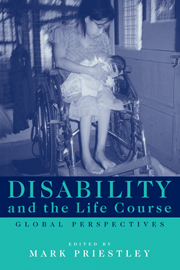Book contents
- Frontmatter
- Contents
- List of figures
- List of tables
- Notes on contributors
- Preface
- Acknowledgements
- A brief note on terminology
- I Concepts
- 1 Introduction: the global context of disability
- 2 Repositioning disability and the life course: a social claiming perspective
- 3 Marginalisation and disability: experiences from the Third World
- 4 Where do we draw the line?: surviving eugenics in a technological world
- 5 A complicated struggle: disability, survival and social change in the majority world
- II Methods and stories
- III The politics of transition
- Index
5 - A complicated struggle: disability, survival and social change in the majority world
Published online by Cambridge University Press: 30 September 2009
- Frontmatter
- Contents
- List of figures
- List of tables
- Notes on contributors
- Preface
- Acknowledgements
- A brief note on terminology
- I Concepts
- 1 Introduction: the global context of disability
- 2 Repositioning disability and the life course: a social claiming perspective
- 3 Marginalisation and disability: experiences from the Third World
- 4 Where do we draw the line?: surviving eugenics in a technological world
- 5 A complicated struggle: disability, survival and social change in the majority world
- II Methods and stories
- III The politics of transition
- Index
Summary
In thinking through my ideas for this chapter, I went back to an old issue of New Internationalist magazine on disability in a global perspective. Rereading some of the articles, I was struck by something that I had not noticed before, an apparent contradiction. Compare these two quotes.
Independent living … is fine in rich countries. But it does not mean very much to the poor disabled person in Bombay or Bogota or Bulawayo whose main problem is getting enough to eat. Zimbabwean activist Joshua Malinga is blunt about it: ‘While people in the rich world are talking about Independent Living and improved services we are talking about survival’.
(Baird 1992: 7; italics added)A few pages on, in another article, Joshua Malinga writes:
Disabled people in Zimbabwe only want equal opportunities and full participation. We want to enjoy the same rights as those enjoyed by other citizens. We must keep working and using our organisations as vehicles of self-help, self-expression and self-representation. We need to fight for freedom, full participation, and independent living. We are not alone in this struggle.
(Malinga 1992: 13; italics added)Joshua Malinga's words go straight to the heart of what disability is all about in the majority world. What first appears to be a contradiction is in fact the perfect way of conveying why the struggle of disabled people is ‘a complicated struggle’. It is a struggle not only for survival but also for social change.
- Type
- Chapter
- Information
- Disability and the Life CourseGlobal Perspectives, pp. 50 - 64Publisher: Cambridge University PressPrint publication year: 2001
- 7
- Cited by



